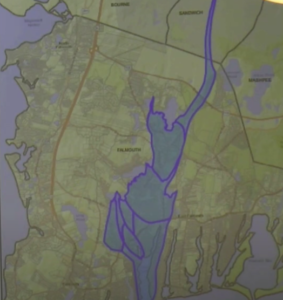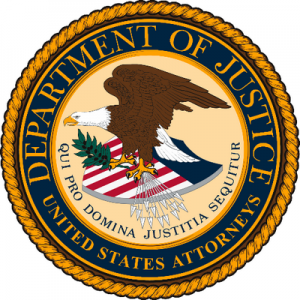
Great Pond in Falmouth. Image courtesy Town of Falmouth.
FALMOUTH – A panel of experts recently gathered in Falmouth to discuss the future of wastewater treatment and plans to address excess nitrogen in Great Pond.
Wastewater Superintendent Amy Lowell spoke at the Future of Wastewater Treatment in Falmouth meeting last month and said of the town’s 14 estuaries, Great Pond has the highest amount of nitrogen required to be removed to restore the estuary.
Although the town has plans to add the Teaticket and Acapesket areas to its sewer in the coming years, Lowell said the biggest challenge for the project has been determining a site for where treated wastewater would be discharged.
She said there is still a small amount of nitrogen left in wastewater even after it’s treated, which creates complications.
“If you put it back on the ground anywhere in Falmouth, it’s in the watershed to a coastal pond, and it therefore is contributing nitrogen load back to that pond,” Lowell said.
“So, it becomes a real challenge, a sort of chasing your tail problem,” she said.
The town will need a discharge site that could handle 1,030,000 gallons per day of treated wastewater when it sewers neighborhoods near Great Pond.
In June, the Falmouth Select Board recommended that two open sand beds the town’s already using for discharge should be expanded to handle more effluent in the short-term.
Additionally, Falmouth may also consider ocean outfall discharge options in Buzzards Bay and Vineyard Sound along with two other parcels of land in the long-term.
The state’s proposed title five changes were also discussed at the meeting.
The changes would require towns to either apply for watershed permits or have property-owners install costly innovative/alternative septic systems (I/As) in order to improve the health of local estuaries.
Association to Preserve Cape Cod Executive Director Andrew Gottlieb called the current Title 5 regulations “inadequate.”
Gottlieb commended the Baker Administration for addressing the code since the laws haven’t been upgraded in over 25 years.
“The code, as I said earlier, has created the situation that we’re trying to restore and recover from now,” he said.
Gottlieb said the proposed changes about updating to I/A septic systems are the state’s way of leveraging towns to move forward with addressing water quality issues.
“I don’t think anybody in their right mind thinks you can convert 120,000 septic systems across Barnstable County in a five-year period,” he said.
In response, Chair of the Water Quality Management Committee Eric Turkington said that Falmouth has been able to take steps toward denitrifying local waters without raising taxes for residents.
Turkington highlighted that once a town applies for watershed permits, it will be mandated to do the work on the Department of Environmental Protection’s schedule.
“We will then be saying to (the voters) ‘We will be raising your taxes a lot because the state made us do it,’” he said.
Turkington said that currently roughly 10% of properties in the town are connected to its sewer system.
Watch the full meeting of The Future of Wastewater Treatment In Falmouth presented by the League of Women Voters.
By Brian Engles, CapeCod.com NewsCenter
























